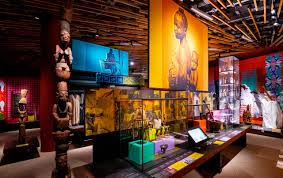Tourism Stakeholders Seek Preservation Of John Randle Centre Lagos
By: Luqmon Balogun, Lagos
Former President of Nigeria, Muhammadu Buhari, Oba of Benin, Omo N’ Oba N’ Edo, Uku Akpolokpolo, Ewuare II, international diplomats among others, all described ithe centre as a way to promote culture and tradition of the Yoruba race after visited the exhibition gallery of the museum.

According to him “On my way to school on a daily basis, I passed through this spot stand in the afternoon, I swim over there. We all know how it used to be before it later demolished.”
A cultural enthusiast, Adeoluwa Mogbonbola said that the J Randle museum in Lagos is a stride towards promotion of Yoruba heritage and enable open a window to the world to learn about history.
“If you want to learn about Yoruba culture and most of what connected us in terms of physical artifact, monuments and historical narrative of the diety, masquerade, powers and principles of leadership, J Randle is the right stop and besides that you can as well relish sumptuous local delicacies that will remind you of the beauty of our local meals, it is indeed the bed of the Yoruba Art and Culture..”
J Randle comes with its special Architectural piece that reflect uniqueness and dynamic Yoruba rich culture and it is a digital facility that welcomes you into the sphere of Yoruba customs and traditions copiously wrapped with cultural values.
Kingsley Omoike is into hospitality business in Lagos, according to him, J Randle is beyond a mere museum, it is a template deliberately designed to preserve the Yoruba culture.
“I will be 70 years in February 2025 and I have spent 56 years in Lagos. I am aware of the Yoruba traditional practices and the J Randle facility is a true definition of how to preserve yesterday for the future.”
Omoike mentioned that the facility is a reservoir of knowledge that anyone regardless of ethical background, religious status and cultural leaning can visit to be abreast of historical idea of Yoruba.
No doubt, Lagos remains the centerpiece of tourism and has the potential for infrastructure that protect and promote Art and Culture in Nigeria as well as Africa and John Randle Centre for Yoruba Culture and History is the gateway to explore the richness embedded in Yoruba culture and traditions.
Going forward, unceasing efforts must be championed by the relevant authorities to ensure these assets are well kept. Museums that still hold on to the artifacts must return them back to the original owners while repatriation of the nation’s cultural inheritance mut be activated towards building the heritage and bring the past, present and the future together.
Victoria Ibanga


Comments are closed.